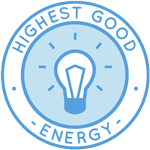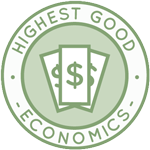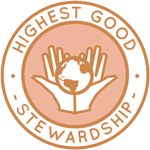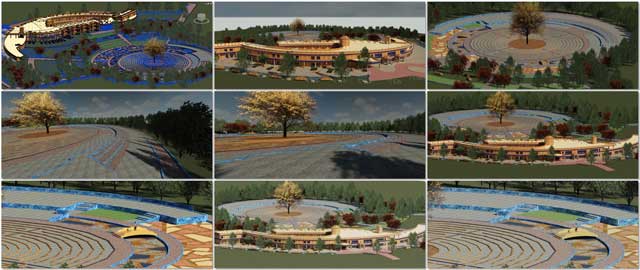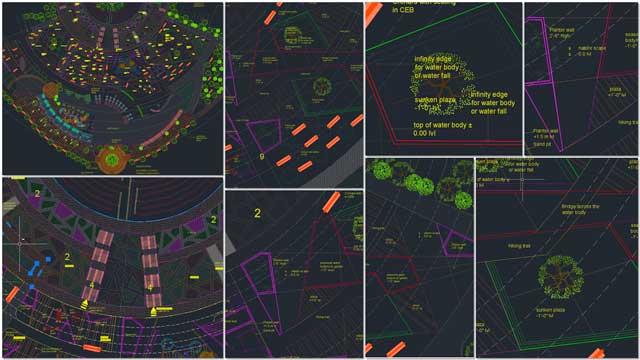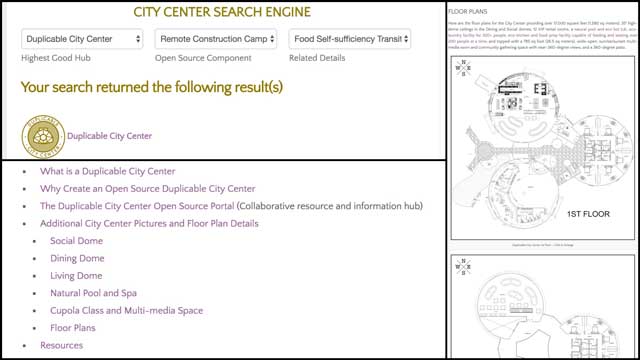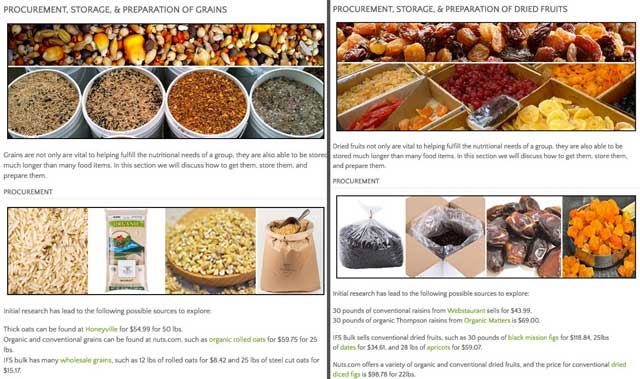Ecological Human Progress – One Community Weekly Progress Update #221
Ecological human progress is needed if we desire to achieve some level of sustainable balance with our planet and all life on it. To accomplish this, the main foundations of our living experience should be addressed sustainably. These would include food, energy, housing, education, economic design, and social architecture. If we make the sustainable solutions to all these areas open source and free-shared, we can evolve and expand them faster for the benefit of everyone. One Community is an all-volunteer team working on this as a model for living and creating for The Highest Good of All.
- Here’s our project overview
- Here’s our world-change methodology
- Here’s how this becomes self-replicating
- Here’s how we are open source and free-sharing all the do-it-yourself designs

OUR MAIN OPEN SOURCE HUBS
Click on each icon to be taken to the corresponding Highest Good hub page.
One Community’s physical location will forward this movement as the first of many self-replicating teacher/demonstration communities, villages, and cities to be built around the world. This is the June 18th, 2017 edition (#221) of our weekly progress update detailing our team’s development and accomplishments:
Ecological Human Progress
One Community Progress Update #221
Here is the bullet-point list of this last week’s design and progress discussed in detail in the video above:
ECOLOGICAL HUMAN PROGRESS: INTRO: @:35
ECOLOGICAL HUMAN PROGRESS: HIGHEST GOOD HOUSING: @7:58
- Created a new icon set and new open source portal section on the Tropical Atrium open source hub (see below)
- Added new resource and Advantages and Disadvantages sections to the Earthbag Village and Straw Bale Village open source hubs (see below)
- Explored adding a 2nd-floor fire-code compliant window to the domes (see below)
- Revised layout and floor plan for Compressed Earth Block Village (see below)
- Ashwin Patil finished version 2.0 of the new search engines for Villages 3-7 and then the core team added those search engines to the related pages (see below)
- Alena Thompson completed her 18th week helping with the Net-zero Communal Bathroom Designs (see below)
- Dean Scholz continued helping us create quality Cob Village renders (see below)
- Hamilton Mateca finished his 45th week helping with the Compressed Earth Block Village design and render details (see below)
- Aparna Tandon continued her work on the Compressed Earth Block Village external elements (see below)
- Guy Grossfeld continued helping with the updates to the Tree House Village furniture and building textures (see below)
ECOLOGICAL HUMAN PROGRESS: DUPLICABLE CITY CENTER: @10:21
- Added the new search engine to the City Center open source hub and finalized updating the formatting of that page to match the updated Earthbag Village and Straw Bale Village pages (see below)
- Finished creation of the TableChair portion of the DIY Pipe Furniture tutorial page (see below)
- Ramya Vudi continued with her development of the PV Solar micro-grid tutorial behind the scenes (see below)
- Shubham Agrawal continued his work on the wind power tutorials developing behind the scenes
- Aravind Vasudevan continued his work on the City Center basement heating and cooling details (see below)
ECOLOGICAL HUMAN PROGRESS HIGHEST GOOD FOOD: @11:49
- Created two new sections under bulk goods on the Food Self-sufficiency Transition Plan page and added the images and procurement details (see below)
ECOLOGICAL HUMAN PROGRESS: HIGHEST GOOD EDUCATION: @12:23
- Continued the process of a final proofreading and editing of all 52 lesson plans (see below)
- Continued working on the renders for the Ultimate Classroom projection-dome feature
- Finished editing the introduction video that preceded the education section and began research and behind-the-scenes work on the licensing and accreditation tutorial (see below)
ECOLOGICAL HUMAN PROGRESS: HIGHEST GOOD SOCIETY: @13:24
- Completed another 25% of the final edits to the open source Taxes and Sustainable Community Building page (see below)
- Jennifer Zhou created and input the first round of images needed for the open source and replicable annual social media strategy (see below)
- Sowmya Manohar and Jono Lewis completed their collective 7th week of work on the The Highest Good Network (see below)
ECOLOGICAL HUMAN PROGRESS: SUMMARY: @14:15
- How you can most help us right now and how anyone can help
CLICK HERE IF YOU’D LIKE TO RECEIVE AN EMAIL EACH WEEK WHEN WE RELEASE A NEW UPDATE
YOU CAN ALSO JOIN US THROUGH SOCIAL MEDIA
ONE COMMUNITY WEEKLY UPDATE DETAILS
ECOLOGICAL HUMAN PROGRESS: HIGHEST GOOD HOUSING PROGRESS
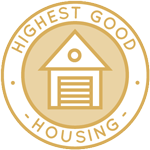 One Community is facilitating ecological human progress through Highest Good housing that is artistic and beautiful, more affordable, more space efficient, lasts longer, DIY buildable, and constructed with healthy and sustainable materials:
One Community is facilitating ecological human progress through Highest Good housing that is artistic and beautiful, more affordable, more space efficient, lasts longer, DIY buildable, and constructed with healthy and sustainable materials:
- Learn about: Our Upcoming Crowdfunding Campaign
- Learn about the different village models: 7 Sustainable Village Models
- Visit the open source portals for the first two: Earthbag Village OS Hub | Straw Bale Village OS Hub
This last week the core team created a new icon set and new open source portal section on the Tropical Atrium open source hub. You can see the new icons and web content here.
We also added new resource and Advantages and Disadvantages sections to the Earthbag Village and Straw Bale Village open source hubs.
And we explored adding a 2nd-floor fire-code compliant window to the domes.
Additionally, the core team revised the layout and floor plan for the Compressed Earth Block Village (Pod 4), as shown here.
Working with the core team, Ashwin Patil (Web Developer) also finished version 2.0 of the new search engines for Villages 3-7 and then we added those search engines to the related pages.
Alena Thompson (Mechanical Engineer) completed her 18th week helping with the Net-zero Communal Bathroom Designs. This week’s focus was creating a second round of renders for the tutorial and outlining the new sections that will include these renders.
Dean Scholz (Architectural Designer) continued helping us create quality Cob Village (Pod 3) renders. Here is update 73 of Dean’s work, this week’s focus was beginning work on the renders for the central dining and presentation space.
Hamilton Mateca (AutoCAD and Revit Drafter and Designer) also finished his 45th week helping with the Compressed Earth Block Village (Pod 4) design and render details. This week’s focus was adding additional blue brick details to the labyrinth area and a new round of complete village test renders.
Aparna Tandon(Architect) continued her work on the Compressed Earth Block Village external elements. What you see here is her 27th week of work, focusing on finishing Zone 7 and beginning the Zone 8 designs and visualizations, as shown here.
And Guy Grossfeld (Graphic Designer) continued helping with the updates to the Tree House Village (Pod 7) furniture and building textures. What you see here are 4th-generation renders of the kitchen, bathroom and shower structures, library, playroom, and residential structures.
ECOLOGICAL HUMAN PROGRESS: DUPLICABLE CITY CENTER PROGRESS
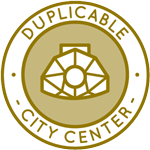 One Community is facilitating ecological human progress through a Duplicable and Sustainable City Center that is LEED Platinum certified/Sustainable, can feed 200 people at a time, provide laundry for over 300 people, is beautiful, spacious, and saves resources, money, and space:
One Community is facilitating ecological human progress through a Duplicable and Sustainable City Center that is LEED Platinum certified/Sustainable, can feed 200 people at a time, provide laundry for over 300 people, is beautiful, spacious, and saves resources, money, and space:
- Learn about this building and it’s function: Duplicable City Center Open Source Hub
This week the core team added the new search engine to the City Center open source hub and finalized updating the formatting of that page to match the updated Earthbag Village and Straw Bale Village pages.
The core team also finished creation of the TableChair portion of the DIY Pipe Furniture tutorial page. You can see pictures of this work here.
Ramya Vudi (Electrical Engineer) continued with her development of the PV Solar micro-grid tutorial behind the scenes. This week’s focus was on the battery sizing and maintenance and control sections shown here.
Shubham Agrawal (Electrical Engineer) also continued his work on the wind power tutorials developing behind the scenes. This week’s focus was on the Industry Outlook, FAQ, Summary, and Resources sections shown here.
Aravind Vasudevan (BA Mechanical Engineering) also continued his work on the City Center basement heating and cooling details. This week’s focus was further research and starting development of the climate battery explanation and tutorial that we’ll be adding to the City Center Heating and Cooling open source hub. You can see some of this work here.
ECOLOGICAL HUMAN PROGRESS: HIGHEST GOOD FOOD PROGRESS
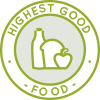 One Community is facilitating ecological human progress through Highest Good food that is more diverse, more nutritious, locally grown and sustainable, and part of our open source botanical garden model to support and share bio-diversity:
One Community is facilitating ecological human progress through Highest Good food that is more diverse, more nutritious, locally grown and sustainable, and part of our open source botanical garden model to support and share bio-diversity:
- Learn about the structures: Hoop House Hub | Aquapini & Walipini Open Source Hub
- See what we’ll be growing: Gardens & Hoop Houses | Large-scale Structures | Food Forest | TA
This week, the core team created two new sections under bulk goods on the Food Self-sufficiency Transition Plan page, one section for grains and one for dried fruits, and added the images and procurement details that you see here:
ECOLOGICAL HUMAN PROGRESS: HIGHEST GOOD EDUCATION PROGRESS
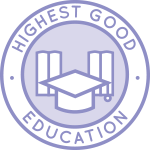 One Community is facilitating ecological human progress through Highest Good education that is for all ages, applicable in any environment, adaptable to individual needs, far exceeds traditional education standards, and more fun for both the teachers and the students:
One Community is facilitating ecological human progress through Highest Good education that is for all ages, applicable in any environment, adaptable to individual needs, far exceeds traditional education standards, and more fun for both the teachers and the students:
- Learn about the components: Education open source hub
- Learn how the components work together: How to use the Education for Life Program
This last week the core team continued the process of a final proofreading and editing of all 52 lesson plans. This week we completed the Happiness Lesson Plan and the Harmony Lesson Plan. This brings us to 28 of 52 finished, which is 53.8% completion.
Additionally, we continued working on the renders for the Ultimate Classroom projection-dome feature. This included exploring different fisheye images with the projection tool and adjusted the lighting.
This all led to creation of this retouched and final version:
We also finished editing the introduction video that preceded this Education section and began research and behind-the-scenes work on the licensing and accreditation tutorial.
ECOLOGICAL HUMAN PROGRESS: HIGHEST GOOD SOCIETY PROGRESS
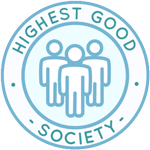 One Community is facilitating ecological human progress through a Highest Good society approach to living that is founded on fulfilled living, the study of meeting human needs, Community, and making a difference in the world:
One Community is facilitating ecological human progress through a Highest Good society approach to living that is founded on fulfilled living, the study of meeting human needs, Community, and making a difference in the world:
- Read the Highest Good society overview: Highest Good Society
- Learn about the model for fulfilled living and sharing: A Day in the Life
- Learn about the 4 economic models: RBE | For-profit | Non-profit | Entrepreneurship
- Learn about our open source community collaboration and management software: The Highest Good Network
This week the core team completed another 25% of the final edits to the open source Taxes and Sustainable Community Building page, this brings us to 75% complete with that page.
Jennifer Zhou (Web Designer) created and input the first round of images needed for the open source and replicable annual social media strategy.
And Sowmya Manohar (Software Engineer, Web Developer & Net Application Developer) and Jono Lewis (Software Developer) completed their collective 7th week of work on the The Highest Good Network. This week they connected authentication in the front end of the application to the back end using a new token-based API system and continued development on editing users and time entry.
AND WE PRODUCED THIS WEEKLY UPDATES BLOG – CLICK HERE TO SUBSCRIBE
FOLLOW ONE COMMUNITY’S PROGRESS (click icons for our pages)
INVESTOR PAGES
GET INVOLVED
CONSULTANTS | WAYS ANYONE CAN HELP | MEMBERSHIP
CLICK HERE FOR ALL PAST UPDATES
WHAT ONE COMMUNITY IS CREATING
One Community is committed to creating a place to grow together and change the world together, fostering ecological human progress. We are creating a space that helps each other live in integrity with each other and the planet as we strive to be the greatest versions of ourselves. We do this by harmoniously respecting each other, nature, and the rest of our one shared planet.
Our goal is to demonstrate what we feel is the most sustainable, healthy, and fun environment we can create. A place based on compassion, kindness, and collaboration. This replicable community will serve as an example of what is possible.
Throughout our design process, we are open sourcing and free-sharing everything needed for construction and replication, with a focus on advancing ecological human progress. This includes what we call “Highest Good” approaches to food, energy, housing, education, for-profit and non-profit economics design, social architecture, fulfilled living, stewardship practices, and more. We are creating these resources for implementation as individual components or complete developments called teacher/demonstration hubs. These hubs will help launch additional hubs as awareness and knowledge grow.
BUILDING THE FIRST OF MANY
One Community will be the first teacher/demonstration hub, pioneering ecological human progress. It will function as an experiential learning model that facilitates mass participation to address humanity’s most pressing challenges through: A replicable model for expansion, building seven self-sufficient village/city prototypes, becoming the world leader in open-source sustainability solutions, and evolving and expanding ALL aspects of sustainable living.
WHY ONE COMMUNITY IS CREATING THIS
The One Community self-replicating model is capable of creating a sustainable planet within 30 years. We will achieve this by establishing successful teacher/demonstration hubs on every continent, each contributing to ecological human progress. Villages include designs appropriate for each of the five main types of climates. They also include options for even the most challenged economies. These hubs will collaborate with one another, share ideas, and resources, and work together as a network to heal the planet. They will also transform the global lifestyle into a more enjoyable, fulfilling, healthy, and sustainable one.
The specifics of how One Community is accomplishing ecological human progress can be found on the One Community Solution Model to Create Solution-creating Models Page. Research supporting and showing the benefits of a model like this can be found in our Research and Resources Articles Archive.
Even if we don’t achieve our ultimate goal of global transformation, a self-replicating teacher/demonstration model like this will take a relatively short period of time to positively affect millions while inspiring millions more, thus advancing ecological human progress. For One Community residents (the Pioneer Team), the idea of creating and sharing the social and recreational experience with visitors is also fun, exciting, fulfilling, and an additional reason why we are creating this.
INSPIRING SUSTAINABILITY WITH OPEN SOURCE
One Community’s four-phase strategy for the creation of solution models that create solution creating models uses open source blueprints for duplication that simultaneously address all aspects of the human experience (food, energy, housing, education, social inequality and injustice, fulfilled living, etc.), promoting ecological human progress. We see these areas as interdependent and requiring a comprehensive solution if humanity is to move ecologically, socially, economically, and permanently towards a truly sustainable future for everyone.
Our open source model and blueprints engage and inspire people while simultaneously making sustainable living more affordable and easy to replicate, thus fostering ecological human progress. By free-sharing the step-by-step plans people need for duplication, inviting people to participate, and demonstrating sustainable teacher/demonstration hubs as a more desirable way of living, the model will predictably expand on its own.
It is this approach we see uniting the world and leading to a new Golden Age for humanity, driven by ecological human progress. While we understand that not everyone believes this is even possible, we are nonetheless bringing together all those that do see this as possible as the non-profit think tank of forward-thinking individuals willing to design, build, and open source project-launch blueprint and free-share it for The Highest Good of All.
COMPREHENSIVE SOLUTION TO HUMANITY’S NEEDS
One Community is dedicated to fostering ecological human progress through an open-source sharing of the evolution of sustainable living that addresses the complete human experience. We are doing this because we see the solutions for global food, housing, energy, education, social inequality, ethical business practices, earth regenerative practices, and a desire for a more fulfilling living experience as inseparably interconnected. As a comprehensive solution, we are addressing all these areas simultaneously and open source free-sharing everything needed for individual duplication and/or duplication as complete self-replicating teacher/demonstration communities, villages, and cities to be built around the world.
As we address and open source share these areas we will establish a living example of the first teacher/demonstration village purposed to teach others, thereby advancing ecological human progress. To maximally facilitate duplication, One Community will provide seven duplicable examples and function indefinitely as a place people can visit and a non-profit and open source think tank continuing to further evolve and share solutions in all of the above areas and more. We will also provide hands-on experience and training. Most importantly, growing upon our sustainable foundation, we will endlessly make this comprehensive solution even more widely known and globally accessible, understandable and diversely duplicable, and inspiring and desirable as a model worth duplicating.
GLOBALLY IMPLEMENTABLE REPLICATION MODEL
The more people that are inspired and desiring for themselves what it is that One Community creates, the more demand there will be for spreading the One Community model. This leads to the directing of financial resources and resourceful people where we believe they are needed most: the establishment of additional sustainable communities around the world.
We also feel this duplication will specifically happen quickly internationally due to the affordability of overseas land, less restrictive building environments, and the spirit of adventure in many people who really desire to make a difference for those who need it most. This collective effort towards establishing sustainable communities globally not only fosters ecological human progress but also contributes to the realization of a more sustainable and equitable future for all.
To meet the increasing demand for sustainability and contribute to ecological human progress, we are coordinating with manufacturers, education institutions, individuals, and vendors. This is also part of this model to help the world. Its purpose is to facilitate more engagement in the sustainability industry, produce the absolute best possible consumer value, and the most convenient delivery of goods and methodologies for building sustainable living communities and sustainable living components.
This means we not only provide education and increase needed sustainability resources, but we also address the underlying roadblocks to a sustainable planet by decreasing the cost and simultaneously increasing the demand and generating financial support for global sustainability, philanthropy, and humanitarian movements and organizations, thereby advancing ecological human progress.
As demand increases, so too will the avenues for participation in advancing ecological human progress. Right now people are participating as consultants or partners donating time to our 501(c)(3) nonprofit organization, and others are more involved as Pioneers of the core team that will be moving to the property. We also have options for people to just follow our progress or participate through internet contribution.
Once the supportive physical infrastructure is about 30% developed, One Community will be ready to additionally expand what we offer to include scholarships, free weekend learning groups, core team members choosing to travel abroad to help others get established too, handling the marketing for all similar models operating for The Highest Good of All, and hosting classes and other sponsored events to promote and demonstrate additional methodologies, thus contributing to ecological human progress.
We also imagine the high likelihood that our organization will become a foundation that can be trusted as the donation point for distribution of monies to help others to establish this model, thus furthering ecological human progress.
 One Community
One Community